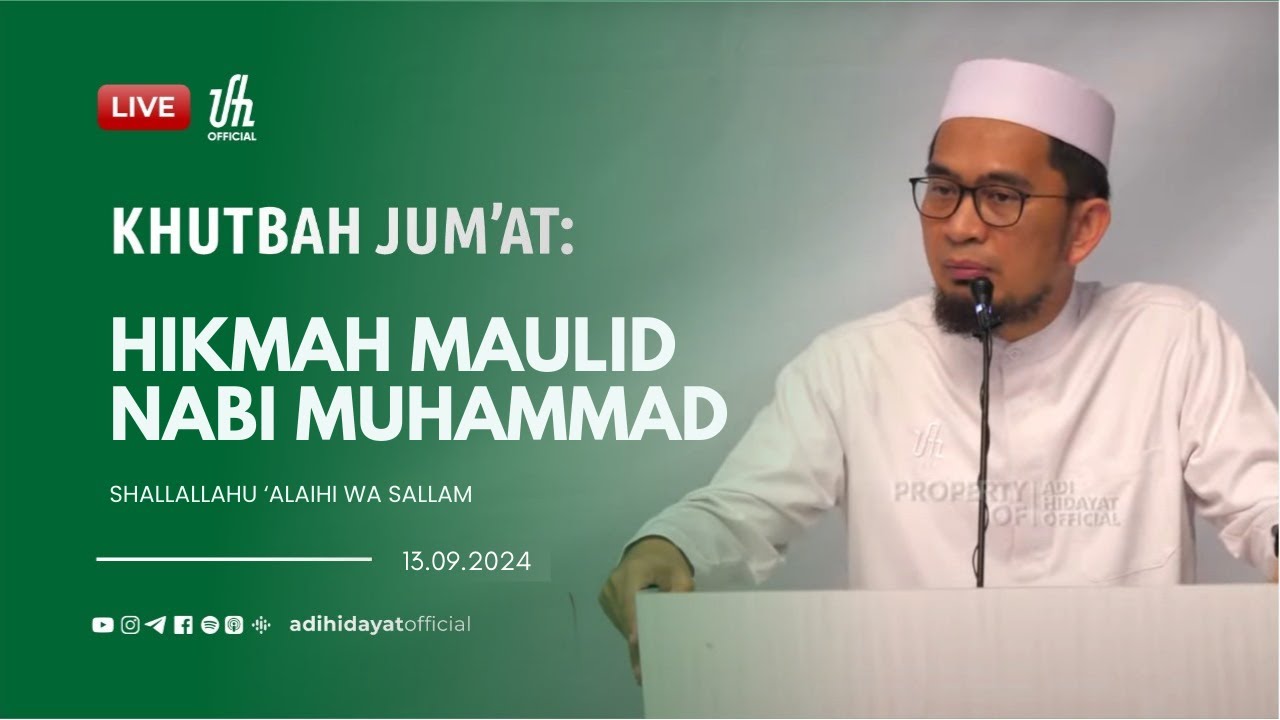Celebrating Prophet's Birthday? Is there any importance of the month of Rabiul Awwal Assim al hakeem
Summary
TLDRThe video addresses the permissibility of celebrating the Prophet Muhammad's birth in the Islamic month of Rabi' al-Awwal. It emphasizes that innovations in religion are not allowed, as the Prophet left a clear path for Muslims to follow. While the Prophet's birth date is debated, his death on the 12th of Rabi' al-Awwal is confirmed. The speaker argues that no Islamic texts, including the Quran and Sunnah, mention celebrating the Prophet's birth. Instead, Muslims are guided to follow the teachings strictly, focusing on approved celebrations like the two Eids.
Takeaways
- 😀 Celebrating the Prophet's birth during the Hijri month is questioned as permissible or not.
- 📜 The Prophet Muhammad (PBUH) left a clear and certain path for Muslims, which should not be innovated.
- 🚫 Introducing innovations in Islamic practices is discouraged and considered rejected.
- 📅 Some months in the Islamic calendar, such as Ramadan and the sacred four months, are highlighted as important in the Quran and Sunnah.
- ❓ Scholars differ on the exact date of the Prophet’s birth (9th, 12th of Rabi al-Awwal, or before). However, all agree on his death date on the 12th of Rabi al-Awwal.
- 🎉 The question arises whether people are celebrating the Prophet's birth or his death, which occurred in the same month.
- 📖 The Prophet’s revelation and his mission are highlighted as more significant than his birth date.
- 🔍 There is no mention in the Quran or Sunnah that emphasizes the Prophet’s birth date as a significant event to celebrate.
- 🕌 When the Prophet arrived in Medina, he found people celebrating, but he only endorsed two festivals: Eid al-Adha and Eid al-Fitr.
- 🛑 Celebrating the Prophet’s birthday is viewed as potentially deviating from the clear path of the Quran and Sunnah, driven by desires and innovations.
Q & A
What is the main question addressed in the script?
-The main question is whether it is permissible to celebrate the Prophet's birth during the month of Rabi' al-Awwal, specifically considering whether this practice aligns with Islamic teachings.
What is the general principle the speaker mentions about innovation in Islam?
-The general principle is that introducing anything new into the religion, which was not part of it originally, is considered an innovation (bid'ah) and is rejected according to Islamic teachings.
What significant events are tied to the month of Rabi' al-Awwal, according to the speaker?
-The speaker highlights that there is a dispute among scholars regarding the Prophet’s exact birth date in Rabi' al-Awwal, but all scholars agree that the Prophet passed away on the 12th of Rabi' al-Awwal.
Why does the speaker emphasize the importance of revelation over birth?
-The speaker emphasizes that what truly matters in the Prophet's life is the day he received revelation and became a messenger, as this marks the beginning of his mission, which is more significant than the day of his birth.
Did the Prophet or his companions ever celebrate his birthday?
-No, the speaker states that neither the Prophet nor his companions celebrated his birthday, and no instructions were given to celebrate it in any way.
How does the speaker view the practice of celebrating the Prophet's birthday in Rabi' al-Awwal?
-The speaker views it as an innovation (bid'ah) that is not supported by the Quran or the Sunnah, and therefore not permissible in Islam.
What does the speaker say about the Prophet's guidance on celebrations in Islam?
-The speaker mentions that the Prophet found the people of Medina celebrating two specific days, and he informed them that Allah had replaced those with two better days: Eid al-Fitr and Eid al-Adha. These are the only two official celebrations in Islam.
Why does the speaker caution against following personal desires or cultural practices?
-The speaker cautions that following personal desires or cultural practices without evidence from the Quran and Sunnah can lead Muslims away from the correct path and toward innovation in religion.
What is the significance of the Prophet's companions not celebrating his birthday?
-The speaker suggests that the Prophet's companions, who loved him deeply and followed his teachings closely, never celebrated his birthday. This indicates that such a practice is not part of authentic Islamic tradition.
What advice does the speaker give to Muslims regarding religious practices?
-The speaker advises Muslims to follow the Quran and Sunnah strictly, avoiding innovations in religious practices, and to be mindful of whether they are following true Islamic teachings or simply cultural traditions and desires.
Outlines

هذا القسم متوفر فقط للمشتركين. يرجى الترقية للوصول إلى هذه الميزة.
قم بالترقية الآنMindmap

هذا القسم متوفر فقط للمشتركين. يرجى الترقية للوصول إلى هذه الميزة.
قم بالترقية الآنKeywords

هذا القسم متوفر فقط للمشتركين. يرجى الترقية للوصول إلى هذه الميزة.
قم بالترقية الآنHighlights

هذا القسم متوفر فقط للمشتركين. يرجى الترقية للوصول إلى هذه الميزة.
قم بالترقية الآنTranscripts

هذا القسم متوفر فقط للمشتركين. يرجى الترقية للوصول إلى هذه الميزة.
قم بالترقية الآنتصفح المزيد من مقاطع الفيديو ذات الصلة

"Kisah Inspiratif: Membaca Kisah Nabi Muhammad dalam Bahasa Arab"

Clarification on Mawlid an-Nabi صلى الله عليه وسلم

Daily Activity Santri II Shalawat Fathimiyah

Penjelasan rinci hukum COD (Cash On Delivery) oleh Ustad Dr Erwandi

[LIVE] Khutbah Jum'at: Hikmah Maulid Nabi Muhammad Shallallahu‘alaihi Wa Sallam - Ustadz Adi Hidayat

Why scholars are against Music - Shaykh Hamza Yusuf
5.0 / 5 (0 votes)
